
The United Nations Security Council has approved a U.S.-drafted resolution to strengthen sanctions on North Korea, in response to its escalating nuclear- and ballistic-missile weapons programs. The new sanctions, which received unanimous support from the council on Saturday, will impose a full ban on roughly a third of North Korean exports, denying them more than $1 billion in annual revenue.
The sanctions are the seventh set to be imposed on North Korea since its first nuclear-weapon test in 2006, but the first international measure to be taken against the regime since President Trump took office. The resolution comes a little more than a week after North Korea successfully tested an intercontinental ballistic missile that was capable of reaching the mainland U.S. It also received the crucial support of China, North Korea’s most important ally and trading partner, and one of the countries that can veto any U.N. Security Council resolution.
In fact, Politico reports that the sanctions negotiations with China, which started following North Korea’s first successful test of an ICBM on July 4, succeeded in derailing a Trump-administration plan to open a trade investigation targeting China. That plan, which Trump and White House officials hinted at last weekend, was apparently due to be announced on Friday. Assuming the Politico report is accurate, staving off the White House represents a rare win for the State Department against other factions in the Trump administration. It also, for now, denies the White House a chance to test whether or not a trade war with China would be a smart way to protect the U.S. from a North Korean nuclear missile.
“This is the most stringent set of sanctions on any country in a generation,” U.S. ambassador Nikki Haley declared before the U.N. Security Council vote on Saturday. Per the resolution, North Korea can no longer export coal, iron, lead, seafood, and a few other materials. New joint ventures with the country are also prohibited, as are new investments in existing ventures, and more North Korean individuals and entities have been added to the preexisting U.N. sanctions blacklist, which freezes assets and travel.
China’s U.N. ambassador, Liu Jieyi, declared on Saturday that the new resolution demonstrates that the world is “united in its position regarding the nuclear position on the Korean peninsula,” and said that China was glad that the U.S. said it was not seeking regime change in Pyongyang or reunification of the two Koreas. North Korea’s denuclearization (which is not very likely) is still a top U.S. priority, however. The U.S. will also continue to conduct its annual military exercises with South Korea, while both China and Russia reiterated their opposition to the deployment of the U.S. THAAD missile-defense system in South Korea, though that issue did not prevent them from supporting the final resolution.
The resolution does not, as the U.S. originally had sought, cut the amount of oil being delivered to North Korea, but the U.S. was apparently able to overcome the initial objections of China and Russia. All involved stressed that they saw the sanctions as a way to force North Korea to the negotiating table over its nuclear- and ballistic-missile weapons programs, but the successful implementation of this — or any — new sanctions on the country will rely almost exclusively on China following through on its end.






























